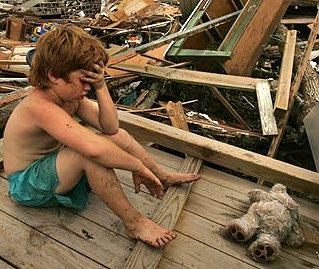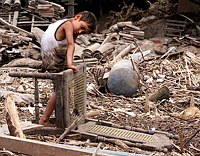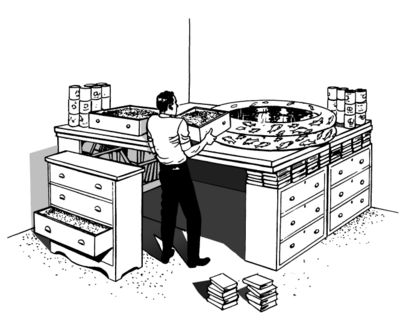LISTENING TO KATRINA
PAGES IN THIS BLOG ARE RATED 'R' AND DO CONTAIN
PROFANITY, VULGARITY, GRAPHIC VIOLENCE, NUDITY,
SCENES OF HUMAN EMOTION, DEATH, DESTRUCTION, MAYHEM, AND VARIOUS
INDESCRIBABLE HORRORS.
PLAN - ACTION Plan DANGER
This page has a worksheet in the Workbook. Click this link for the worksheet: WB013.PDF
There are two phases of the NOT SAFE or DANGER plan, and we're going to do the easy one first. Go ahead and pull up the Workbook page for this page from the link above. You may want to make notes as we go along.
I have been trying to alternate pages between lessons, plans, and actual events. This page should be an EVENT page where I tell you gruesome true-life stories about people who stayed in their homes and experienced DANGER. To be honest, I was unsure how to do that. There are so many stories in my notebook that I had trouble knowing where to start. Trapped on a roof? Pulling your dead neighbor out of his house right after the storm? Stranded on the evacuation route due to breakdown or fuel shortage? Watching your spouse drown? Watching water rise in the street? Watching human beings turn into desperate animals as law and order collapse around you?
Rather than try to lay out a particular scenario at this point, I'd rather talk about the PLAN, and then tell the individual stories in their own time. The ACTION Plan DANGER found on this page is applicable to every scenario. It's a blueprint for short-term success no matter what you are facing. We'll come back and 'test' the plan against various stories and anecdotes as we progress along the timeline.
I would like at this time to introduce you to my first smarmy motivational quote. I have tried to live my life to this ideal since I first read it at age 12:
However seriously systems and measures may be discussed, they cannot be put into practice unless there is the right man to do it. There is no deed without a doer. To have the right man is the greatest blessing! One must aim at being that man. - Saigo Takamori (1827-1877)
We'll come back to that. For now, on to ACTION Plan DANGER! I know it sounds a little comic-bookish, but what else can we call it?
There are two separate phases of this plan because there are two separate possibilities. The easiest scenario is that some kind of disaster strikes early on a Saturday morning while everyone is awake and at home. The hardest scenario is when some kind of disaster strikes without warning and you are at work, the kids are at school, and your spouse is half-way across town. If you manage to pull off the hard one, then everyone is probably going to end up at home - and you'll need this plan for that eventuality as well.
Let's assume that everyone is at home on a Saturday morning - awake, dressed, and just finished breakfast. Now we stir in some disaster, attack, or emergency. We already have our Escape and Bug-Out plans ready to go if we need to leave - but what if we have to stay? We need to know what to do if we either can't get out or have decided that leaving is worse than staying put. ACTION Plan DANGER is strictly a short term plan to get us to ACTION Plan SAFE. Once we reach a SAFE condition, then we can switch over to ACTION Plan SAFE.
Remember the key points:
Assess Consolidate Tactics Improvise Observe Navigate
ASSESS
 You
have had an emergency or a disaster, and one of several scenarios has played
out. The fire department is on the way, a tornado just took the roof
off, a hurricane has laid waste to the entire area, aliens have landed three
blocks over and there is general panic and civil unrest - the list goes on.
Whatever has happened, the Gods are Angry and we are in DANGER.
You
have had an emergency or a disaster, and one of several scenarios has played
out. The fire department is on the way, a tornado just took the roof
off, a hurricane has laid waste to the entire area, aliens have landed three
blocks over and there is general panic and civil unrest - the list goes on.
Whatever has happened, the Gods are Angry and we are in DANGER.
A very large problem with sudden disasters and emergencies is denial. When watching disasters and large emergencies on television, how many times have you heard these phrases:
"I never thought the water would get this high."
"I never thought the water would rise that fast."
"I never thought the fire would come this far."
"I never thought the building would collapse."
All of these are some variation of the same mindset, which is either, "It can't happen here.", or, "It won't happen to me."
There is another kind of psychological aberration that occurs in some people - and it's really strange to see. Having your house destroyed is a very traumatic event, and some people do not react well to that - to the point of disbelieving that it has happened at all. I was told one account by a fireman friend of mine who went into a burning house and found a lady sitting in an easy chair in the front room. The fire had started at the back of the house, and the lady was startled to see him suddenly come into her house through the open screen door.
"You have to get out! Your house is on fire!", he told her.
She looked at him and said the most curious thing; "No, it isn't."
Even after he pulled her out of the chair and into the yard, she continued to insist that her house was not on fire. Once the fire was out and she saw the gutted kitchen, she said, "Oh, that's all right. It's not really burned at all."
There are some case examples of people living in flooded out homes after Katrina who were in total denial that their home was unlivable. I suspect - given purely anecdotal evidence - that this is somewhat rare but can happen to people in any kind of disaster or emergency.
A very major portion of ASSESS in the beginning is going to be to think clearly about what has just happened and to honestly assess your situation - no matter how hard that might be. Do you have enough of an engineering background to say whether or not what's left of your house is in danger of collapse? What are the immediate dangers around you? Where is your spouse? Where are your children? Is everyone accounted for? Does anyone need rescue?
The only thing we are interested in at this point is securing the lives of the people immediately around us and understanding the nature of the situation. Once you have done that, you can broaden the circle to include securing the neighbor's lives if that is applicable.
Another immediate danger is panic or hysteria in either yourself or those around you. Keep everyone calm and take the time to soothe children if that time is available. Time isn't something that is likely to be on your side...
If you are under direct attack by zombies, aliens, looters, rioters, or rabid chipmunks, then defense trumps all other considerations and you should vigorously defend your position. That's actually a good metaphor - defending your position. Your immediate goal in the ASSESS phase is to understand what is happening and to try to keep things from getting worse.
CONSOLIDATE
We've talked about the idea of HYST - Having Your Shit Together - before SHTF. Now we need to talk about something else just as important.
 If
you are following ACTION Plan DANGER then something has just happened.
Some extremely serious shit, perhaps - maybe to the point that one or more
of your family members is dead. It's somewhat amazing to me that none
of the family-friendly 'emergency preparedness' manuals put out by
government or charitable groups ever seems to address this point.
If
you are following ACTION Plan DANGER then something has just happened.
Some extremely serious shit, perhaps - maybe to the point that one or more
of your family members is dead. It's somewhat amazing to me that none
of the family-friendly 'emergency preparedness' manuals put out by
government or charitable groups ever seems to address this point.
Shit has Hit The Fan - and it's everywhere. You need to Get Your Shit Together.
You already know about the physical dangers, but few people discuss the psychological dangers. Different people react differently to the sudden shock (and in some cases horror) of a disaster or emergency. Some may be in denial, some may panic, some may simply freeze in place. You may have to think for these people and you may have to treat them roughly to get them facing in the right direction and moving forward.
This is where we drag up Saigo again.
However seriously systems and measures may be discussed, they cannot be put into practice unless there is the right man to do it. There is no deed without a doer. To have the right man is the greatest blessing! One must aim at being that man.
The same words apply to women as well. Few enough people physically prepare for SHTF, but even fewer people prepare mentally for that eventuality. You are what you do when it counts - so when it counts, take charge and take action.
If you are not alone, your first responsibility - and your first resource - is other people. Now is the time to apply all those leadership skills. Start giving orders like you expect them to be obeyed. People are very responsive to taking orders, and if you apply yourself to moving everyone in the same direction, everyone will benefit. If someone cannot or will not follow your directions then you'll have to make a decision on if you have the time and resources to save them - either from the disaster or from themselves.
If the water is rising and your kids don't want to get into the car, then PUT them in the car. If your 90 year old neighbor with no other friends or relatives doesn't want to come along, then you'll have to decide if her right to be stupid outweighs the practicality of dragging her out of her own home and 'kidnapping' her to a safe location. I suppose that will depend on how much you like the neighbor in the first place. For the most part I do respect individual rights of stupidity.
 Sometimes,
however, you have to make the decision to take them along with you - even if
by force. Let's say that there has been a tornado and all the homes in
your vicinity have been destroyed. The weather is very severe and you
need to get out and find better shelter. You notice that the
neighbor's 5 year old son is trying to pull his dead parents out of the
wreckage of their house. You tell him to come with you, but he doesn't
want to leave his mom and dad. It's very dangerous for him to stay,
and another squall line is moving in. Given the circumstances, I'd
'kidnap' him and take him with me.
Sometimes,
however, you have to make the decision to take them along with you - even if
by force. Let's say that there has been a tornado and all the homes in
your vicinity have been destroyed. The weather is very severe and you
need to get out and find better shelter. You notice that the
neighbor's 5 year old son is trying to pull his dead parents out of the
wreckage of their house. You tell him to come with you, but he doesn't
want to leave his mom and dad. It's very dangerous for him to stay,
and another squall line is moving in. Given the circumstances, I'd
'kidnap' him and take him with me.
 The
photo at right was taken in Biloxi after Katrina. The photo at left in
Honduras after hurricane Mitch. After any widespread disaster there
are likely to be children who have either lost their parents to the Reaper
or have been physically separated from them. After Katrina there were more
of these children than I expected - for reasons we will get into later.
The
photo at right was taken in Biloxi after Katrina. The photo at left in
Honduras after hurricane Mitch. After any widespread disaster there
are likely to be children who have either lost their parents to the Reaper
or have been physically separated from them. After Katrina there were more
of these children than I expected - for reasons we will get into later.
Nowhere else on this blog will I advocate for a purely humanitarian act: Look for and care for these children. It isn't their fault that their parents weren't ready. I will admit that in doing so you take on a serious - and potentially dangerous - responsibility. You will also have to make a choice at some point; if you cannot find any rightful guardians of the child then you will either have to care for the child while you keep looking or turn them over to a government agency.
In addition to lost children, the same thing might apply to a neighbor who is mentally deficient to start with, or who is having some psychological breakdown due to the event and isn't thinking clearly. Perhaps you have an agreement with the neighbor's relatives to look after him or her. There are many factors you will have to consider quickly, and make a case-by-case decision. If you reasonably believe that the fire is going to sweep through your valley and everyone who stays will die, then that can create hard choices. If these people are not your legitimate responsibility all you can really do is offer them a ride (if you have room) - and leave them behind if they decline.
Your responsibility to other people extends as far as your own humanity. If you hear an infant wailing in a shattered house, wouldn't you go and see what you could do to help? If it was your own infant and you were unfortunately killed in the event, wouldn't you want someone to rescue her and take her to safety?
Once you have consolidated all the living human beings within the scope of your influence, it's time to turn our attention to organizing for physical needs. If small children are involved, assign one of the adults (or an older teen) to keep those children at the ACTION point because that's going to be your immediate command center. If any adult is experiencing short term psychological breakdown, then those persons should likewise be kept from wandering away from the ACTION point. If at any time the situation becomes dire and you must move, escape or bug-out then you will want to know exactly where those kids are. You don't want them off somewhere playing in storm debris, contaminated water, or otherwise getting themselves into trouble.
Once you've secured the kids, work on the needs. If it's cold, then everyone needs to have appropriate clothing. If it's hot, then everyone needs to stay hydrated. If anyone is injured, they need first aid. Don't be surprised if the kids - and some of the adults - fall asleep due to crashing adrenalin levels after an exciting time. Immediate needs all revolve around shelter, water, and medical attention. We aren't worried about food at this point - it's not like you're going to starve between here and SAFE.
Once immediate needs are resolved - or you have accepted that you cannot resolve them at this point - then collect any available and relevant resource. Available means that you can get it without too much trouble without putting yourself in too much danger. Relevant means that you will or may need it within an hour. If you are stuck on a roof with flood waters all around you, then the nearest boat or large floating object is relevant. If civil unrest is the danger, then look to your defenses. Bring together whatever you can - that includes people and material.
Don't forget to keep track of your Life Goes On bag and all the wealth it contains.
TACTICS
Once you have a good assessment and have consolidated resources, it's time to apply tactics. Those who have been paying attention will immediately say, "Tactics are the individual elements of a strategy - so what's the strategy?"
In any such context, the strategy is, "Do what you can where you are with what you have." (Thanks, Ted!)
Your immediate tactics will revolve around a simple decision: Stay or Leave? If you are gong to Leave, then you need a method of transportation (even if that's on foot) and you need a direction to move. Sometimes your direction will be towards some goal, other times it will be a simple direction - away from the fire, to higher ground, or to a more secure place, etc. This is something that you cannot foresee until the event itself, so it isn't a bad idea to consider some options beforehand.
You should already understand the risks in your area, so you can play different scenarios in your head based on those. If there is an earthquake and your house shifts off its foundation, what are your options? Really imagine some possible situations and imagine how you might resolve them.
If you are going to stay, then your tactics will include securing a stable shelter, providing for short-term (3-4 day) needs, establishing a secure perimeter, and continuing to consolidate resources in expectation of future ACTION.
If you are in need of rescue, then your tactics will all revolve around attracting rescue personnel and preparing to be rescued. I will provide an entire page on that later.
IMPROVISE
 You
may *need* something, but not have it. Your two options in that case
are to do without it or to improvise.
You
may *need* something, but not have it. Your two options in that case
are to do without it or to improvise.
The gentleman at the right is improvising a fallout shelter. The image was lifted from a 1967 government brochure on surviving nuclear fallout. While the actual benefit of his shelter is in question, it provides a mode of thinking about resources that is illustrative.
Interior doors can be removed from their hinges and used for many things besides the roof of a fallout shelter. Nailing them over exterior windows to seal your house against the elements and wandering zombies, for instance.
Furniture can be moved and used for different purposes - shoring up a collapsing wall or restricting access to a dangerous area of the house. Furniture can also be broken up for firewood. Area rugs can be used in the manner of tapestries to provide extra insulation in a room.
Know which walls in your house are not supporting walls - you could disassemble them if you need the material. Destroyed homes can be cannibalized for materials to make temporary repairs on standing structures or to construct temporary shelters. If you have prepared well (which is something we will cover in later pages) you should have various materials already on hand - such as tarps - to make emergency repairs.
If you need to appropriate or borrow anything that you need for your survival, then do so. I'm not talking about looting, I'm talking about scavenging and appropriating, which are different from looting. Looting is someone picking through someone else's belongings or property to steal valuables. Scavenging and appropriating mean using something in an emergency - even something that does not belong to you.
To use an easy example, let's say that your child falls down a well. In order to rescue the child, you need a rope. Unfortunately you do not have one. Your neighbor, however, has one and it is sitting on his front porch. He isn't home, though, and you cannot ask him if it's okay to borrow it. Don't bother about asking, go get the rope! What kind of human being would refuse to lend it to you anyway?
What if the rope is locked in his shed, but you know that it's there? Is it acceptable to break the lock on the door to get the rope? I suppose that depends on how much you love the child in the well. If it's all the same to you, then respect the lock. As for me, I'll burn the whole damn shed down if I have to - but I would, of course, rebuild it or pay restitution and compensation to the neighbor.
This is, admittedly, an easy example. Other situations may not be so easy to resolve. I would go so far as to say that you should appropriate any abandoned or unguarded property for your immediate use if that immediate use means your (or someone else's) immediate survival. If you do take or use something, the decent thing to do is offer compensation later.
Let's say that there is a wildfire blowing your way. Your family is the last to leave and you discover that your car will not start. The fire will overtake you in less than 15 minutes. Your neighbor was smart enough to evacuate early, but left a perfectly good car in his driveway. If escaping from the dangerous area means breaking into the neighbor's house to get the keys and stealing the neighbor's car to escape, then that's what you should do. Considerations of life and limb trump property rights in an emergency. The neighbor might even thank you later for saving his car from the flames.
 Some hard-core property rights people will have a problem with
this.
Too bad. If property rights are more important to you than life and
limb, then you can just sit there and burn in that scenario. How
noble.
Some hard-core property rights people will have a problem with
this.
Too bad. If property rights are more important to you than life and
limb, then you can just sit there and burn in that scenario. How
noble.
If you are stranded with your children on your roof because the water came up too fast, and a perfectly decent boat floats by with nobody in it - then that's your ticket to escape. Take it. You can work out the rental fee with the lawful owner later. I would not have any problem with someone who borrowed something of mine because they needed it for their immediate survival. I would appreciate it if they would replace whatever it was at some later time, but if it made the difference between life and death then I'm good with it.
I am not talking about items of comfort or convenience. I am only talking about things that impact your immediate, short-term survival in a desperate situation. Anything else is looting - and looters should be dealt with in the harshest terms.
OBSERVE
Keep your head up and your eyes open. Gather as much information as you can from as many sources as you can. Adjust your Assessment as you gather information. Is what you are doing working? Do you need to do something different?
A lot of people in Metairie evacuated two days after Katrina because there was a concern that the levees would fail on the Metairie side. The levee held, but if it didn't... Do not believe rumors. Only trust legitimate sources. Listen to the radio - but be aware that official announcements may be an hour or two behind actual events on the ground.
NAVIGATE
Remember that our end goal is Home, but right now we're just looking for SAFE. Concentrate your efforts on that for the time being. Take care of yourself and your family before you take care of anything or anyone else.
***
ACTION Plan DANGER is a bare-bones outline applicable to just about any DANGER situation. It is not, however, something that you are going to open your workbook for and start checking off boxes. You'll have to remember what to do because time is not likely to be on your side. If you make it through one pass of the DANGER plan, then start again with Assess and adjust your assessment and keep going.
Katrina showed us over and over again that people who sat around on their butts and waited for someone else to help them did very poorly. KEEP MOVING FORWARD!
Shane
